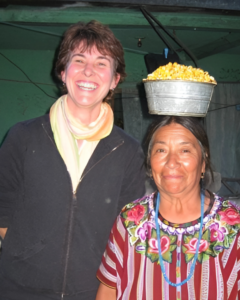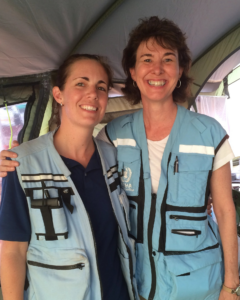From Kentucky to Kabul: How Janet O’Callaghan is Making Her Mark on the World
“I wanted to make a difference,” Janet O’Callaghan says, reflecting on two decades of humanitarian work with the United Nations. “The Peace Corps was one of the few ways an American like me could do that.”
Today, from a UN base in Istanbul, she coordinates global humanitarian information for the UN Office for the Coordination of Humanitarian Affairs (OCHA) — a job that involves ensuring the right data gets into the hands of people making life-or-death decisions.
But for O’Callaghan, the numbers have never been just numbers. “We deal with maps and data, yes, but they represent people. You have to keep people at the center of everything you’re doing.”
A Leap of Faith
 O’Callaghan grew up in Kentucky and North Carolina before earning her degree from the University of North Carolina in Charlotte. After graduate school and eight years in the private sector, she took a leap of faith: leaving a stable, lucrative job to serve in the Peace Corps in Guatemala.
O’Callaghan grew up in Kentucky and North Carolina before earning her degree from the University of North Carolina in Charlotte. After graduate school and eight years in the private sector, she took a leap of faith: leaving a stable, lucrative job to serve in the Peace Corps in Guatemala.
“Everyone thought I was crazy,” she says. “But it was the best decision I ever made.”
In Guatemala, she worked with rural municipal governments to build basic mapping and data systems — skills that unexpectedly opened the door to her first humanitarian assignment during the Iraq War in 2003. “Someone read an article I’d written in a trade magazine and offered me a one-month contract in Jordan. I took a chance. That was the start of everything.”
Since then, she’s helped coordinate crisis responses across Liberia, Sudan, Sri Lanka, Haiti, the Philippines and more. “I immediately realized this world was for me.”
O’Callaghan recalls watching food aid arrive in crisis zones and seeing the look of relief on women’s faces. “That’s when it hits you: this work matters. Even a little bit can make a big difference.”
The Cost of Disengagement
Today, even that “little bit” that O’Callaghan and aid workers like her have been able to provide is under threat with increasing pressure on the humanitarian system — from growing global needs to declining donor trust and funding. O’Callaghan sees the consequences firsthand.
“With the cuts, we’re losing data partners,” she warns. “Right now, we still know where people are hungry. But in a few months? We’ll know less. We won’t see the early warnings. We’re going to miss things.”
It’s not just a bureaucratic problem — it’s a life-threatening one. “People who were already on the knife’s edge are going to start falling over in greater numbers than they would have otherwise.”
Right now, we still know where people are hungry. But in a few months? We’ll know less… People who were already on the knife’s edge are going to start falling over in greater numbers than they would have otherwise.”
And while humanitarian workers will continue to do what they can with what they have, O’Callaghan fears the damage is already underway. “There will be lives lost due to this.”
America’s Role — and Responsibility
 As an American working in the international system, O’Callaghan says she’s always been proud of her country’s humanitarian leadership.
As an American working in the international system, O’Callaghan says she’s always been proud of her country’s humanitarian leadership.
“When you go out and see that USAID logo — ‘From the American People’ — you think, we’re making a difference. And people know it. They feel it.”
She points out that humanitarian aid represents a tiny sliver of the U.S. federal budget — less than half a percent — but generates enormous global goodwill and strategic value.
“It has an outsized impact on our security, our ability to negotiate, our ability to be a player on the world stage. We’re losing that, and I think that’s incredibly sad.”
The View from Ohio
As a resident of New Bremen, Ohio — a rural community surrounded by farmland — O’Callaghan sees the domestic benefits of U.S. foreign aid more clearly than ever.
“I live in a part of the U.S. with many farmers —farmers from whom USAID was buying food to feed people around the world,” she says. “We’re not just helping others. We’re helping ourselves.”
“We’re not just helping others. We’re helping ourselves.”
It’s a message she hopes more Americans will hear — and heed.
“When we walk away from this work, the world doesn’t stop needing it. We just stop being part of the solution.”
Whatever may happen in Washington, there’s no question that O’Callaghan will never stop being part of the solution — and the communities she serves are certainly better for it.
